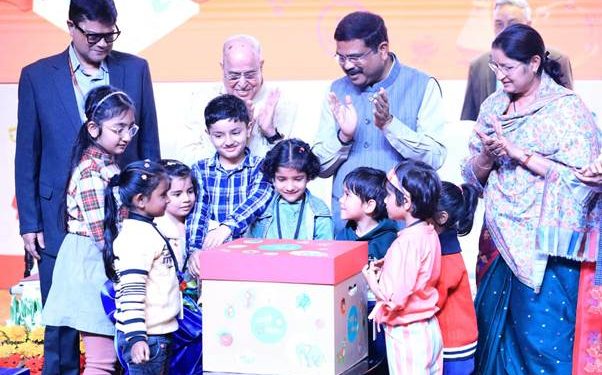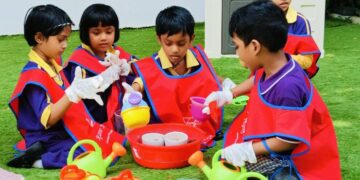Exactly four months after it launched the NCF for Early Education or Foundational Stage (FS) in October 2022, the union Ministry of Education (MoE) on February 20, 2023, unveiled ‘Jadui Pitara’—a kit of play-based learning-teaching material in box comprising Toys, Puzzles, Puppets, Posters, Flash cards, Workbooks, Posters, Teacher’s Handbook etc., for the foundational stage of first five years (age group of 3-8 years) under 5+3+3+4 structure as outlined in the National Education Policy (NEP) 2020. In layman terms, this is the model curriculum for this stage from NCERT.
‘Jadui Pitara’ developed under the National Curriculum Framework is available in 13 Indian languages (Hindi, English, Urdu, Punjabi, Bengali, Gujarati, Kannada, Marathi, Tamil, Telugu, Malayalam, Odia, Sanskrit). The more than 1200 KVS schools are expected to adopt the curriculum this year. Currently 50 Kendriya Vidyalayas in a pilot mode have started Balwadi (Nursery class) last year and the rest are expected to add this class from July this year. Similarly, CBSE affiliated schools are also expected to incorporate the new pedagogy and curriculum in their play school wings. The states may take their own decision on timing and own versions. According to Prof Dinesh Prasad Saklani, NCERT Director, the curriculum can be modified, improved and adopted according to need, culture, local resources and context as ‘Jadui Pitara’ serves as a model standard and not the absolute. The SCERTs are expected to take a call on the new curriculum in next a few months.
Sanjay Kumar, secretary DoSE & L while speaking on the launch event made it clear that it is time each stakeholder looks at school education through the new pattern of 5+3+3+4 pattern and aligns thought process accordingly. He implied that DNA of school education is being fundamentally transformed and the launch of new pedagogy is a red letter day for country’s education system.
National Steering Committee head Prof. K. Kasturirangan, who spoke during the launch talked about how the new curricular and pedagogical structure is an array of creative processes. He said that the new pedagogy and curriculum for FS is to nurture attitude, curiosity, imagination, and skills besides ideals of resilience, self-regulation, ethics and aesthetics. “In this exercise, no singular importance has been given to classrooms and that is the central change in this curriculum while also ensuring empowerment of teachers,” he added.
Union Education Minister, Dharmendra Pradhan, who is seen increasingly getting involved in NEP related initiatives to boost the teams and outcomes also brings in his experiential perspectives and networking opportunities. “A lot of FS material was available with NCERT even before this exercise but now NEP 2020 has formally made this sea change of bringing play way of learning to schooling and for masses. What is being launched today are essentially guidelines and as the ecosystems from SCERTs to startups and toy makers start coming together, this will radically transform the foundational education for better of children and country.”
Jaadui Pitara Snapshot
Jaadui Pitara has been developed as an exemplar collection of learning teaching materials useful to teachers to enable play-based learning for children aged 3-8 years. Various components have been mapped with curricular goals and competencies of the foundational stage. It takes care of all the domains for leading to holistic development by ensuring multi sensorial activities and use of hands. Play is at the core. Easy to use, age-appropriate, attractive for children, variety and collection, simple language has been ensured by experts like Prof Manjul Bhargava, renowned mathematician.
The idea is to provide opportunities for children to explore, open up and talk for language development, read stories, solve puzzles. The pedagogy is also for creating situations for critical thinking, encouraging children to create own toys, poems, drawing etc.
Teachers, trainers, parents and schools can create their own Jaadui Pitara simply by collecting local toys, games and puppets, activity books with local flavor, local story books and cards, making own posters, collecting local poems.
Jaadui Pitara has also been made digitally available on DIKSHA platform – portal and can be accessed fully there for digital content, downloads and audios etc.
Flows from NCF-FS 2022
Local context and rootedness in addition to use of mother tounge is one of the areas of focus in the NCF-FS. And within these defines and other curricular goals of the FS stage, NCERT with the help of other agecnies and experts has been working for the past six monthss on development of this pedagogy and curriculum. And NCERT in September 2022 brought out a Toy-Based Pedagogy based on the principle that toys are not just for entertainment or recreation, but can also be used as a learning resource for the mental, physical, social and emotional development of the child. The expansive and illustrative textbook contains a road map for curriculum developers, teachers and teacher educators on the various aspects of Toy-Based Pedagogy. “Toys can open up and ignite the mind of the child. These guidelines on Toy-Based Pedagogy have been designed to promote integration of toys and its pedagogy into the curriculum in School Education, Early Childhood Care and Education and Teacher Education.”
Drawing inspiration from panchakosha Taittiriya Upanishad, the NCF-FS 2022 includes its concept and maps different koshas–Annamaya, Pranamaya, Manomaya, Vijnanamaya and Anandamaya with the domains and curricular goals identified for the foundational stage for physical development, socio-emotional and ethical development, cognitive development, language and literacy development, aesthetic and cultural development, and development of positive learning habits as the basis for curricular development.
So, toys and Panch Koshas are a major part of the new curriculum for FS.
…AN















